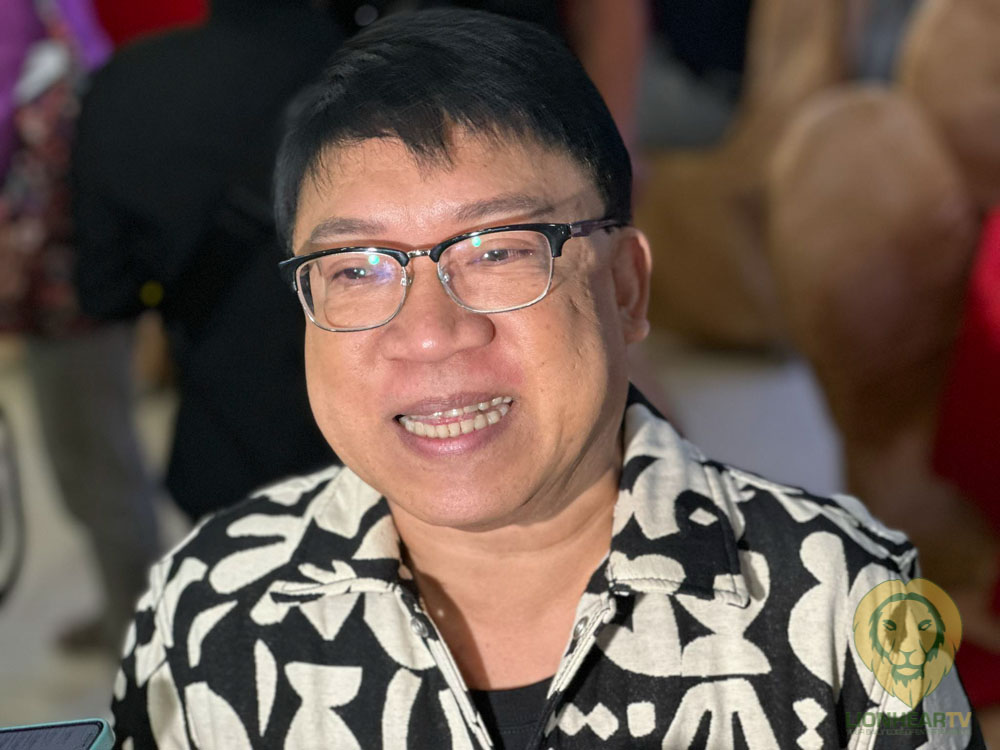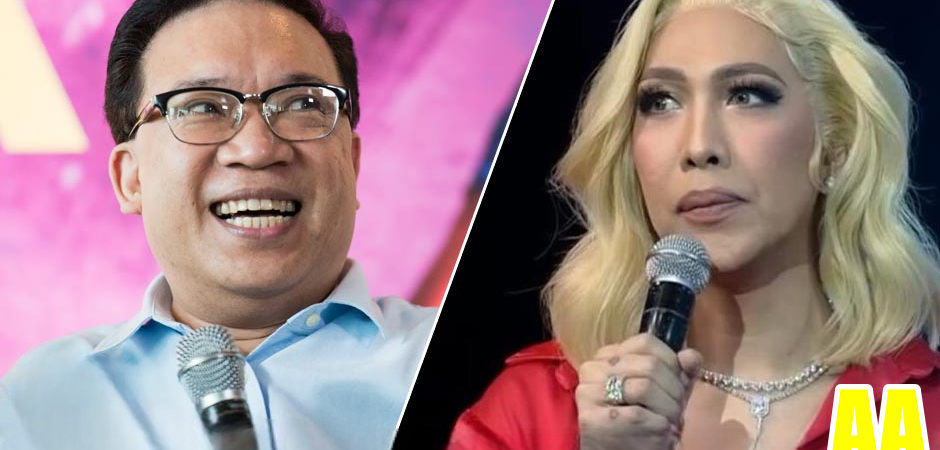Veteran comedian Roderick Paulate spoke out in defense of fellow comedian Vice Ganda amid criticism of the ‘It’s Showtime’ host’s brand of humor, emphasizing that the comedian’s popularity is a reflection of what resonates with audiences.

During the press conference for GMA Network’s new series ‘Mga Batang Riles’, Paulate shared his thoughts on the evolution of comedy and the public’s reaction to modern comedians.
“Kumita kasi at kinagat ng tao,” Paulate explained. “Sabihin na natin na si Vice (Ganda) yun. Hindi kasalanan ni Vice ‘yun. Kinagat ng tao eh.”
Paulate, known for his respectful approach to humor, advised comedians to find the right balance in their performances.
“Ang advise ko lang dapat, timplado lang,” he added. “In person, pag nakikita ko si Vice magalang eh. Ang mahirap lang dyina-judge siya ng tao. Minsan, natural lang na magkamali ka. Hindi niya intention na makasakit. Nakikita ko ‘yung mga tao tumatawa. Pag siguro, nararamdaman niya na nasasaktan na ang tao, matututo rin ‘yan. Nangyari rin sa akin ‘yan.”

The award-winning comedian also reflected on how his career began with serious roles before transitioning to comedy, thanks to the encouragement of the late Comedy King, Dolphy.
Following Dolphy’s advice, Paulate became a household name for his roles in iconic films like ‘Mga Anak ni Facifica Falayfay’, ‘Gorio and Tekla’, and ‘Petrang Kabayo’.
Despite the changes in the entertainment industry, Paulate said his brand of humor—based on real-life scenarios—continues to resonate with audiences.
“Feeling ko, blessed lang talaga ako na buhay pa rin (ang uri ng aking comedy). Old school. Kahit sa States, may nagme-message sa akin na kahit madaling araw para maging masaya sila, pinanonood nila ako,” he said.
As Paulate returns to television with projects like ‘Mga Batang Riles’ on GMA Network and ‘Da Pers Family’ on TV5, he remains a beacon of comedic excellence and a firm advocate for empathy and growth in the comedy industry.
Roderick Paulate, a seasoned actor and comedian in the Philippines, recently shared his thoughts on the enduring popularity of Vice Ganda, one of the country’s most beloved entertainers. In an interview, Paulate expressed his belief that it’s not Vice Ganda’s fault that people love his brand of comedy, emphasizing that the comedian’s success stems from his ability to connect with audiences and deliver what they want. Paulate’s remarks have sparked discussions about the nature of comedy, the role of entertainers, and the dynamics between performers and their audiences.
Vice Ganda, known for his sharp wit, quick humor, and unapologetic personality, has become a household name in the Philippines. His rise to fame has been nothing short of meteoric, with his comedy shows, films, and television appearances consistently drawing massive audiences. Paulate, who has been in the entertainment industry for decades, acknowledged Vice Ganda’s talent and the significant impact he has had on the comedy scene. He noted that Vice Ganda’s success is a testament to his ability to resonate with people and give them what they enjoy.
Paulate’s comments come at a time when Vice Ganda’s style of comedy has faced criticism from some quarters. Detractors argue that his humor can sometimes be edgy or controversial, pushing boundaries that not everyone is comfortable with. However, Paulate was quick to defend Vice Ganda, pointing out that comedy is subjective and that what works for one person may not work for another. He stressed that Vice Ganda’s popularity is a reflection of the audience’s preferences, not a deliberate attempt to offend or provoke.
The veteran actor’s perspective highlights an important aspect of comedy: its ability to reflect and respond to the tastes of its audience. Comedy, as an art form, is deeply rooted in cultural and social contexts, and what makes people laugh often depends on their experiences, values, and sensibilities. Vice Ganda’s success, according to Paulate, is a result of his keen understanding of his audience and his ability to deliver humor that resonates with them.
Paulate’s defense of Vice Ganda also underscores the challenges that comedians face in navigating the fine line between humor and controversy. In an industry where pushing boundaries can lead to both acclaim and criticism, comedians must constantly balance their creative instincts with the expectations of their audience. Paulate’s remarks suggest that Vice Ganda has managed to strike this balance effectively, earning the loyalty of fans while staying true to his unique comedic voice.

The conversation about Vice Ganda’s comedy also raises broader questions about the role of entertainers in shaping public discourse. Comedy has long been a powerful tool for social commentary, allowing performers to address sensitive topics in ways that are both entertaining and thought-provoking. Vice Ganda’s humor often touches on issues related to gender, identity, and societal norms, making him a polarizing figure for some but a voice of empowerment for others. Paulate’s comments highlight the importance of recognizing comedy as a form of expression that can spark conversations and challenge perspectives.
Paulate’s support for Vice Ganda is also a reflection of his own experiences in the entertainment industry. As a comedian who has faced his own share of challenges and controversies, Paulate understands the pressures that come with being in the public eye. His empathy for Vice Ganda’s position speaks to the camaraderie that often exists among performers, who share a mutual understanding of the demands and rewards of their craft.
The veteran actor’s remarks also serve as a reminder that entertainers are, ultimately, products of their audience. While comedians like Vice Ganda have the freedom to create and perform, their success is ultimately determined by the people who watch and support them. Paulate’s observation that it’s not Vice Ganda’s fault that people love his comedy underscores the symbiotic relationship between performers and their fans. It’s a dynamic that shapes the entertainment industry and drives the evolution of comedy as an art form.
Paulate’s comments have also sparked discussions about the responsibility of comedians in shaping public perceptions. While some argue that comedians should be mindful of the impact of their humor, others believe that comedy should be a space for freedom and creativity, even if it means pushing boundaries. Paulate’s defense of Vice Ganda suggests that he leans toward the latter, viewing comedy as a form of expression that should not be constrained by external expectations.
Ultimately, Roderick Paulate’s perspective on Vice Ganda’s comedy offers valuable insights into the complexities of the entertainment industry. His belief that it’s not Vice Ganda’s fault that people love his humor highlights the importance of understanding the relationship between performers and their audiences. It also underscores the subjective nature of comedy and the challenges that comedians face in navigating their craft.
As Vice Ganda continues to dominate the Philippine comedy scene, Paulate’s remarks serve as a reminder of the power of humor to connect, entertain, and inspire. Whether or not one agrees with Vice Ganda’s style of comedy, there is no denying the impact he has had on the industry and the loyalty he has earned from his fans. Paulate’s defense of Vice Ganda is a testament to the enduring appeal of comedy and the unique ability of performers to bring joy and laughter to people’s lives.
In a world where opinions about comedy can be deeply divided, Paulate’s perspective offers a balanced and empathetic view of Vice Ganda’s success. It’s a reminder that comedy, at its core, is about connection—and that the love of an audience is perhaps the greatest validation a comedian can receive. As the entertainment industry continues to evolve, the conversations sparked by Paulate’s remarks will undoubtedly shape the way we think about comedy, performers, and the power of laughter to bring people together.



